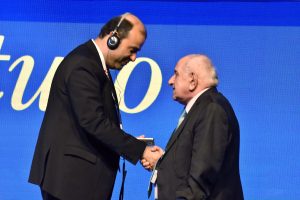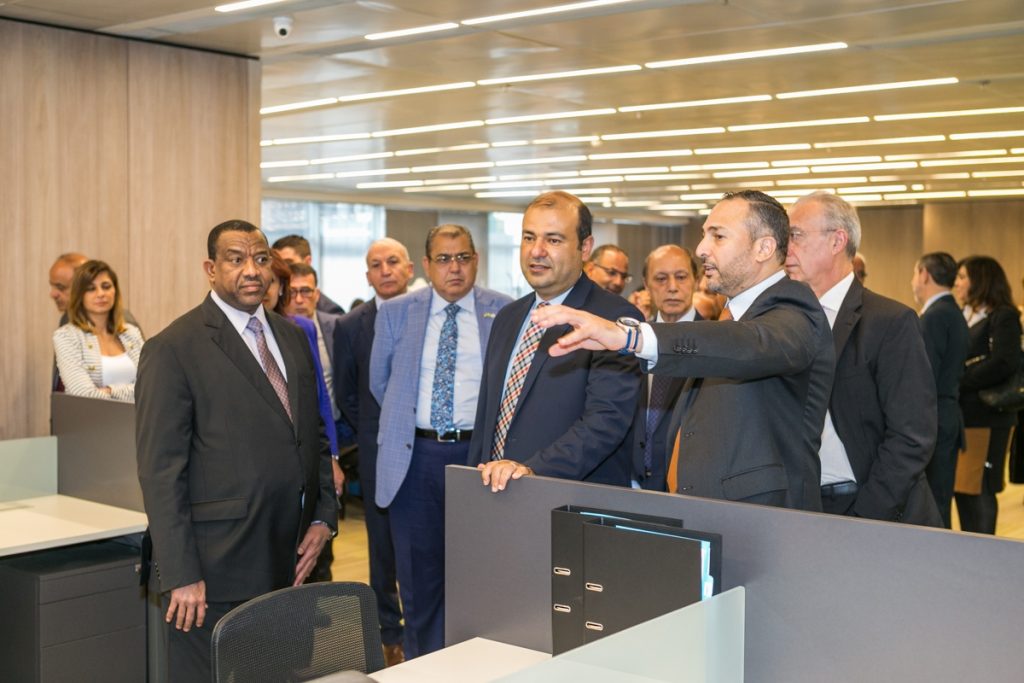São Paulo – After the Brazil-Arab Countries Economic Forum, held last Monday (02), in São Paulo, the secretary-general of the Union of Arab Chambers, Khaled Hanafy (pictured above, in the center), expects trade between Brazil and Arabs to rise to another level. “The forum suggested the change from simple trade to a strategic alliance,” he said to ANBA this Thursday (05) during a visit to the Arab Brazilian Chamber of Commerce in São Paulo.
Hanafy came to Brazil to attend the forum and for other commitments scheduled by the Arab Chamber. A former minister of Supply and Domestic Trade of Egypt, Hanafy recently took the position of secretary-general of the Union, which is the main pan-Arab corporate organization. It gathers the chambers of commerce of Arab nations and the joint chambers, such as the Arab Brazilian Chamber.

“Strategic partnership is the new name of the game, to increase a basic level trade balance of USD 20 billion ad reach a level that is representative of the USD 5 trillion of Gross Domestic Product (GDP) of both sides,” said the executive. The USD 20 billion is the trade balance between Brazil and the Arabs in 2017 and the USD 5 trillion is the sum of the GDPs of Brazil and the region’s nations.
He pointed out that the massive participation of Brazilian and Arabs authorities and business owners in the forum was a demonstration that there is an interest in broadening the relations. The event was attended by over 700 people, with at least 100 of them coming from the Arab countries, plus the presence of president Michel Temer, the Finance minister, Henrique Meirelles, and other high-ranking Brazilian government officials.
“Brazil is a relatively closed-off market relative to the size of its economy, since international trade amounts to only 17%, so there is room for improvement. The Arab world, on the other hand, is very open, at 70%, and some of that openness could be directed towards Brazil in a strategic alliance,” he said.
According to Hanafy, Brazilian companies can set up branches in Arab countries, “not only to tap into the region’s 400 million residents, but to a market of 2 billion people via trade agreements.” Middle East and North Africa countries sustain free-trade or association agreements with the European Union, African blocs and amongst themselves.
“The forum opened doors for the future, but we need to move forward in implementing the great ideas that came up [during the event],” he said.
Priority
Regarding his priorities at the General Union of Arab Chambers, Hanafy said the strategy is to “achieve the old dream of a common market, but using modern technology.” He explained that an economy and trade “digitization megaproject” is underway to get suppliers and buyers in touch, not only via Arab chambers, but also through joint chambers like Brazil’s.
This week, at a meeting of joint chamber secretary generals in São Paulo, it was agreed that a mobile phone app will be designed to connect those organizations and their members, and eventually the chambers in Arab countries themselves, thereby establishing a major online network of business contacts.
Translated by Sérgio Kakitani & Gabriel Pomerancblum




